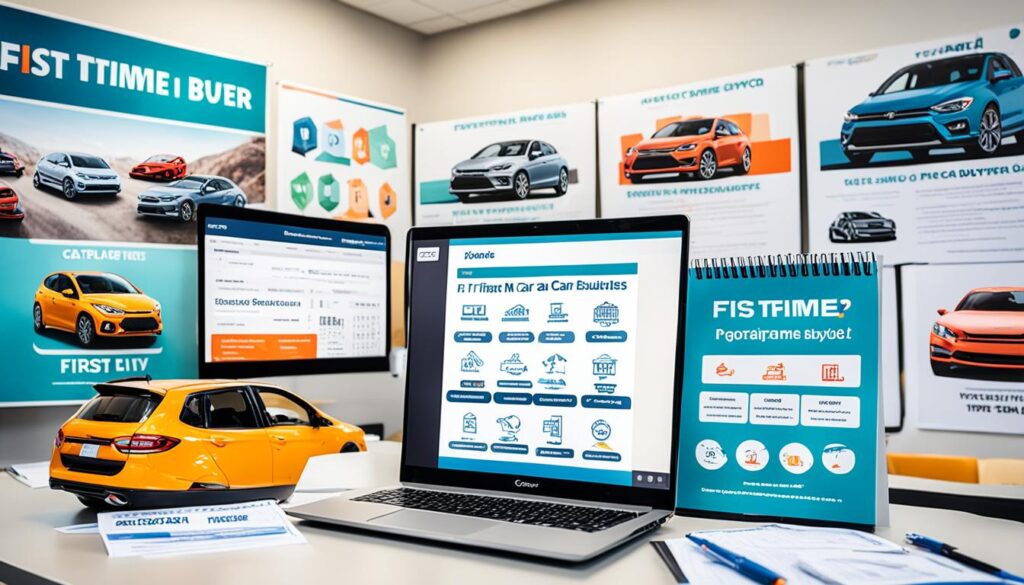Securing an auto loan for the first time can be an exciting yet overwhelming experience, especially if you’re a new borrower. Making informed decisions and understanding the loan process is key to ensuring you get the best deal. In this article, we will provide you with valuable tips to navigate the world of first-time auto loans.
Key Takeaways: First Time Auto Loan
- Understand your budget and loan approval factors before applying for a first-time auto loan.
- Getting preapproval and comparing loan rates can help you find the best terms for your loan.
- Research and choose the right vehicle based on your needs and preferences.
- Be prepared when visiting the dealership and focus on negotiating the out-the-door price.
- Understanding auto loan rates and terms is crucial in assessing the overall cost of the loan.
Understanding Your Budget and Loan Approval Factors
Before applying for a first-time auto loan, it’s crucial to understand your budget and the factors that affect loan approval. By considering key elements such as car payment, loan term, and monthly expenses, you can make informed decisions that align with your financial situation.
Evaluating Car Payment and Loan Term
When determining your budget, it’s important to calculate how much you can comfortably afford for your monthly car payment. This will help you avoid financial strain and ensure that you can make consistent payments throughout the loan term. Consider your current income, existing expenses, and future financial goals.
The loan term is another critical factor to consider. It refers to the length of time you have to repay the loan. Longer loan terms may result in lower monthly payments, but they can also mean higher overall costs due to increased interest rates. Shorter loan terms generally have higher monthly payments, but you could potentially save on interest expenses.
Factoring in Your Monthly Expenses
Before committing to a loan, it’s essential to examine your monthly expenses and ensure that your car payment fits within your overall budget. Consider other financial obligations such as rent or mortgage payments, utility bills, groceries, and any outstanding debts. Subtracting these expenses from your monthly income will give you a clearer idea of your financial capacity.
Assessing Eligibility and Credit Score
Lenders carefully evaluate loan applications, and one of the key factors they consider is your credit score. Your credit score reflects your creditworthiness and ability to manage debt responsibly. A higher credit score may increase your chances of loan approval and potentially result in more favorable interest rates.
Obtaining a copy of your credit report allows you to assess your credit history and address any inaccuracies or negative items that may impact your credit score. It’s crucial to ensure that your credit report accurately reflects your financial standing before applying for a loan.
Understanding your budget and the loan approval factors is integral to securing a first-time auto loan that aligns with your financial situation. By evaluating car payment, loan term, monthly expenses, and credit score, you can make informed decisions and increase your chances of loan approval.
Getting Preapproval and Comparing Loan Rates

Before stepping foot into a dealership, it’s important to obtain loan preapproval for your car loan. This process allows you to understand the loan amount you qualify for and the interest rate you can expect. By taking this step, you can shop and compare rates from multiple lenders to ensure you secure the best loan terms to suit your needs. Additionally, preapproval gives you more negotiating power when it comes to discussing interest rates with the dealership.
Here’s how you can get preapproved for a car loan:
- Gather your financial documents: Start by collecting necessary documents such as proof of income, identification, and any other documentation required by the lender.
- Choose the lender: Research various lenders and their preapproval processes. Consider factors such as interest rates, loan terms, and customer reviews to make an informed decision.
- Complete the loan application: Fill out the loan application provided by the chosen lender. Provide accurate information about your personal finances, employment history, and other relevant details.
- Submit the application: Once you’ve completed the loan application, submit it to the lender for review. Be prepared to provide any additional documentation if requested.
- Review and compare offers: Once you receive preapproval, take the time to review and compare the loan offers from different lenders. Pay attention to interest rates, loan terms, and any fees associated with the loan.
- Negotiate if necessary: If you’ve received multiple offers, don’t be afraid to negotiate for better terms. Use the competing offers as leverage to potentially secure a lower interest rate or more favorable loan terms.
Remember, obtaining preapproval for a car loan allows you to have a clear understanding of your budget and the loan terms you can expect. This puts you in a stronger position when it comes to negotiating with dealerships and choosing the loan that best fits your needs.
Researching and Choosing the Right Vehicle

When it comes to purchasing a car, conducting thorough research is essential. You want to find a car model that aligns with your needs, preferences, and budget. Here are some key factors to consider during your research:
- Fuel Efficiency: Determine the fuel efficiency you require based on your daily commute or travel needs. Consider whether you prioritize a hybrid or electric vehicle for better fuel economy.
- Size: Evaluate what size of vehicle suits your lifestyle. Do you need a compact car for city driving or a larger SUV for family trips and outdoor activities?
- Cost: Set a budget for your car purchase and consider the cost of ownership beyond the initial price. Expenses like maintenance, insurance, and repairs should also factor into your decision.
- New or Used: Decide whether you prefer a brand new car or are open to purchasing a used vehicle. Both options have their advantages, so weigh them carefully.
Utilize online resources and customer reviews to gather information about various car models and their features. Look for reputable websites that provide detailed specifications and user insights. Additionally, visit car manufacturer websites for official information about their models. Try to find reviews from different sources to get well-rounded perspectives.
Research is key when choosing a car. It empowers you to make an informed decision based on your specific needs and preferences.
By undertaking thorough research, you can confidently narrow down your options and select the perfect car model for you.
| Car Model | Fuel Efficiency (MPG) | Size | Cost | New or Used |
|---|---|---|---|---|
| Honda Civic | 32 city / 42 highway | Compact | $21,050 – $28,100 | New |
| Toyota Camry | 28 city / 39 highway | Mid-Size | $25,045 – $35,545 | New |
| Ford Explorer | 21 city / 28 highway | Full-Size | $32,225 – $54,480 | New |
| Toyota Corolla | 30 city / 38 highway | Compact | $19,825 – $25,725 | New |
| Nissan Rogue | 27 city / 35 highway | Compact | $25,650 – $36,830 | New |
Being Prepared for the Dealership

When it comes to purchasing a car, being prepared and knowledgeable before stepping into the dealership can make all the difference. Understanding the car negotiation process and focusing on the out-the-door price are crucial steps to ensure you get the best deal. Additionally, having the necessary loan documentation ready and considering a co-signer if needed can improve your chances of loan approval. Let’s dive deeper into these key elements.
Understanding the Negotiation Process
Car negotiation is an integral part of the car buying experience. It’s important to educate yourself on negotiation strategies to secure the best possible deal. Keep in mind that the final price of the car isn’t the only factor to consider. Be aware of additional costs such as taxes, registration fees, and any other dealership fees that contribute to the out-the-door price.
“Negotiating the out-the-door price gives you a clear picture of the total cost of owning the car.”
By focusing on the out-the-door price, you can have a better understanding of the overall expenses you’ll incur when purchasing the vehicle.
Bring the Necessary Loan Documentation
When applying for car financing at the dealership, having the required loan documentation readily available is essential. This will help streamline the loan approval process and demonstrate your preparedness. The specific documents may vary depending on the lender, but some common documents include:
- Proof of identity (driver’s license, passport)
- Proof of income (recent pay stubs or tax returns)
- Proof of residence (utility bills or lease agreement)
- Proof of insurance
By having these documents on hand, you can expedite the loan application process and increase the likelihood of a successful approval.
Considering a Co-signer
If you have a limited credit history or a lower credit score, having a co-signer can significantly improve your chances of loan approval. A co-signer is someone who agrees to take on the responsibility of the loan if you’re unable to make payments. This provides the lender with an added level of security, as the co-signer’s credit history and income are also taken into consideration.
Before asking someone to be your co-signer, make sure they fully understand the responsibilities involved. It’s essential to maintain regular on-time payments to protect both your and your co-signer’s credit. With a co-signer, lenders may be more willing to approve your loan application and offer more favorable interest rates.
| Benefits of Having a Co-signer | Considerations When Choosing a Co-signer |
|---|---|
|
|
By considering a co-signer, you can increase your chances of successfully obtaining a car loan and potentially secure more favorable loan terms.
Understanding Auto Loan Rates and Terms

When it comes to auto loans, understanding the rates and terms is essential to make informed decisions about your car purchase. Auto loan rates are determined by various factors, including your credit score, loan term, and the specific lender you choose. Let’s dive into each of these aspects to help you navigate the world of auto financing.
1. Credit Score
Your credit score plays a significant role in determining the interest rate you’ll receive for your auto loan. Lenders use your credit score to assess your creditworthiness and determine the level of risk they face in lending you the money. Generally, the higher your credit score, the lower the interest rate you can qualify for. It’s crucial to maintain a good credit score by making timely payments and managing your credit responsibly.
2. Loan Term
The loan term refers to the length of time you have to repay the loan. Auto loans typically range from 36 to 72 months, although longer terms may also be available. It’s important to consider the loan term carefully, as it can impact the total cost of your loan. While longer loan terms result in lower monthly payments, they may result in paying more interest over the life of the loan. On the other hand, opting for a shorter loan term can save you money on interest payments in the long run.
3. Lender Choice
Each lender may offer different interest rates and loan terms, so it’s crucial to compare rates from multiple lenders. Shopping around allows you to find the best loan terms that suit your needs and potentially negotiate a lower interest rate. Different lenders may also have varying eligibility criteria and requirements, so it’s important to review these factors when choosing a lender.
Now, let’s take a closer look at how loan rates and terms can affect the overall cost of your car loan.
| Loan Term | Interest Rate | Monthly Payment | Total Interest Paid |
|---|---|---|---|
| 48 months | 4.5% | $375 | $1,530 |
| 60 months | 5.0% | $325 | $2,500 |
| 72 months | 5.5% | $275 | $3,940 |
As you can see from the table above, the loan term and interest rate have a significant impact on the total cost of the loan. Opting for a shorter loan term not only reduces the total interest paid but also allows you to pay off the loan faster. On the other hand, a longer loan term may result in lower monthly payments but a higher overall cost due to increased interest charges.
By comparing loan rates from different lenders and considering the loan term that aligns with your financial goals, you can make an informed decision that minimizes the cost of your car loan.
Exploring First-Time Car Buyer Programs

For individuals with limited or no credit history, purchasing their first car can be challenging. However, there are first-time car buyer programs offered by many lenders and car manufacturers specifically designed to help these borrowers. These programs provide more flexibility in terms of credit requirements and may offer lower down payment options, making it easier for first-time buyers to get behind the wheel.
In order to take advantage of these programs, it’s important to research and explore different options available in the market. Compare the credit requirements, down payment options, and lender offerings to find a program that suits your needs and financial situation.
Building Credit History and Improving Loan Approval

If you have limited or no credit history, it can be more challenging to get approved for a first-time auto loan. Lenders rely on your credit history and credit score to assess your repayment capability and determine the interest rate for your loan. However, there are steps you can take to build your credit history and improve your chances of loan approval.
- Make On-Time Payments: Paying your bills on time is crucial for establishing a positive credit history. Set up automatic payments or create calendar reminders to ensure you never miss a payment.
- Consider Credit-Building Programs: Some financial institutions offer credit-building programs specifically designed for individuals with limited credit history. These programs often provide tools and resources to help you build credit, such as secured credit cards or credit-builder loans.
- Monitor Your Credit Report: Regularly review your credit report to check for any errors or inaccuracies that could negatively impact your credit score. If you find any errors, dispute them with the credit bureaus to have them corrected.
Quote:
“Building a solid credit history takes time and effort. By making on-time payments and utilizing credit-building programs, you can strengthen your credit profile and improve your chances of loan approval.” – [Your Name], Credit Expert
By taking these steps, you demonstrate to lenders that you are a responsible borrower and can be trusted to repay your loan. Over time, as you continue to make on-time payments and build a positive credit history, your credit score will improve, which will make it easier to qualify for future loans at favorable interest rates.
Remember, building credit history is a journey, and patience is key. Stay committed to financial responsibility, and you’ll reap the rewards of a stronger credit profile and greater access to credit in the long run.
| Credit History Building Tips | Benefit |
|---|---|
| Make on-time payments | Establish a positive credit history |
| Consider credit-building programs | Access tools to improve credit |
| Monitor your credit report | Identify errors and correct inaccuracies |
Building credit history is essential not only for getting approved for an auto loan but also for future financial endeavors. By following these strategies, you can set yourself on a path towards better credit and financial success.
Also Read : What Types Of Documentation Are Required For Income BasedLoan Applications?
Conclusion
Securing a first time auto loan can be an intimidating process for those who are new to car financing. However, by following these helpful tips and gaining a thorough understanding of the loan process, you can confidently navigate the journey of obtaining your first car loan. It all starts with budgeting wisely and determining the loan amount that fits comfortably within your financial means.
Next, take the time to compare loan rates from different lenders to ensure you get the best deal. Shopping around can potentially save you thousands of dollars over the life of your loan. Additionally, don’t forget to explore first-time car buyer programs offered by lenders and car manufacturers. These programs often have more lenient credit requirements and may offer lower down payment options, making them an attractive choice for beginners.
As you embark on the car financing process, keep in mind that building a positive credit history is key. Make your loan payments on time and consider participating in credit-building programs to strengthen your creditworthiness. Regularly monitoring your credit report for any errors or discrepancies is also important, as it can impact your credit score and ultimately affect your loan approval.
With these tips in mind, you can confidently navigate the world of first time auto loans and find the best financing options for your needs. Remember to stay informed, make informed decisions, and drive away in the car of your dreams!
FAQs
Q: What is the importance of getting a first auto loan?
A: Getting a first auto loan is crucial for new borrowers as it helps establish credit history and can pave the way for future financial opportunities.
Q: How can I improve my chances of qualifying for a first auto loan?
A: To improve your chances of qualifying for a first auto loan, you should consider programs to help first-time borrowers, such as those offered by credit unions or car buyer programs designed for new borrowers.
Q: Should I opt for a new or used vehicle for my first auto loan?
A: Whether you choose a new or used vehicle for your first auto loan depends on factors such as your budget, preferences, and the terms offered by lenders. It’s essential to carefully consider your options before making a decision.
Q: What is the role of an auto loan calculator in the borrowing process?
A: An auto loan calculator is a helpful tool that can assist you in estimating monthly payments, total interest costs, and potential loan terms. It can be beneficial in planning your budget and understanding your financial obligations.
Q: Can recent college graduates qualify for a first auto loan?
A: Yes, recent college graduates can qualify for first auto loans, especially if they have a stable income and decent credit history. Some lenders offer programs specifically tailored to help new graduates purchase their first vehicle.
Q: How does credit history impact the interest rate on a first auto loan?
A: Your credit history plays a significant role in determining the interest rate on your first auto loan. Borrowers with a strong credit history typically qualify for lower interest rates, while those with limited or poor credit may face higher interest rates.
Q: Are there specific finance options available for borrowers with bad credit?
A: Yes, borrowers with bad credit can explore options such as auto credit programs or specialized lenders who work with individuals facing credit challenges. However, it’s essential to be cautious of higher interest rates and stricter terms that may apply.
Q: What is an auto loan?
A: An auto loan is a loan specifically designed to help people purchase a vehicle from a dealership.
Q: How can I qualify for a first-time auto loan?
A: Qualification for a first-time auto loan typically requires you to make proof of employment, meet credit and income requirements, be at least 18 years old, and demonstrate the ability to make regular payments.
Q: What is APR in the context of auto loans?
A: APR stands for Annual Percentage Rate. It is the annual rate charged for borrowing and includes any fees or additional costs associated with the loan.
Q: What are some tips for first-time auto loan borrowers?
A: First-time auto loan borrowers should research different lenders and programs, provide necessary documentation, consider their budget and credit score, and negotiate the terms of the loan before agreeing to any offers.
Q: Are there special programs for first-time car buyers?
A: Yes, some dealers and lenders offer auto loan programs specifically designed for first-time car buyers. These programs may have less stringent requirements and may provide additional benefits such as rebates or lower interest rates.
Q: How can I get an auto loan if I don’t meet the credit requirements?
A: If you don’t meet the credit requirements for a traditional auto loan, you can explore alternative options such as credit unions, dealer financing, or lenders that specialize in bad credit loans.
Q: What factors should I consider before getting an auto loan?
A: Before getting an auto loan, consider your budget, credit score, the purchase price of the vehicle, the loan term, and the interest rate offered by the lender.
Q: Where can I find related articles on auto loans and financing?
A: You can find related articles on auto loans and financing on reputable financial websites, car buying platforms, and by consulting with financial experts or auto loan specialists.
Source Links
- https://www.marketwatch.com/guides/car-loans/first-time-car-buyer/
- https://www.nerdwallet.com/l/first-time-car-buyer
- https://www.bankrate.com/loans/auto-loans/how-to-get-a-good-deal-on-your-first-auto-loan/